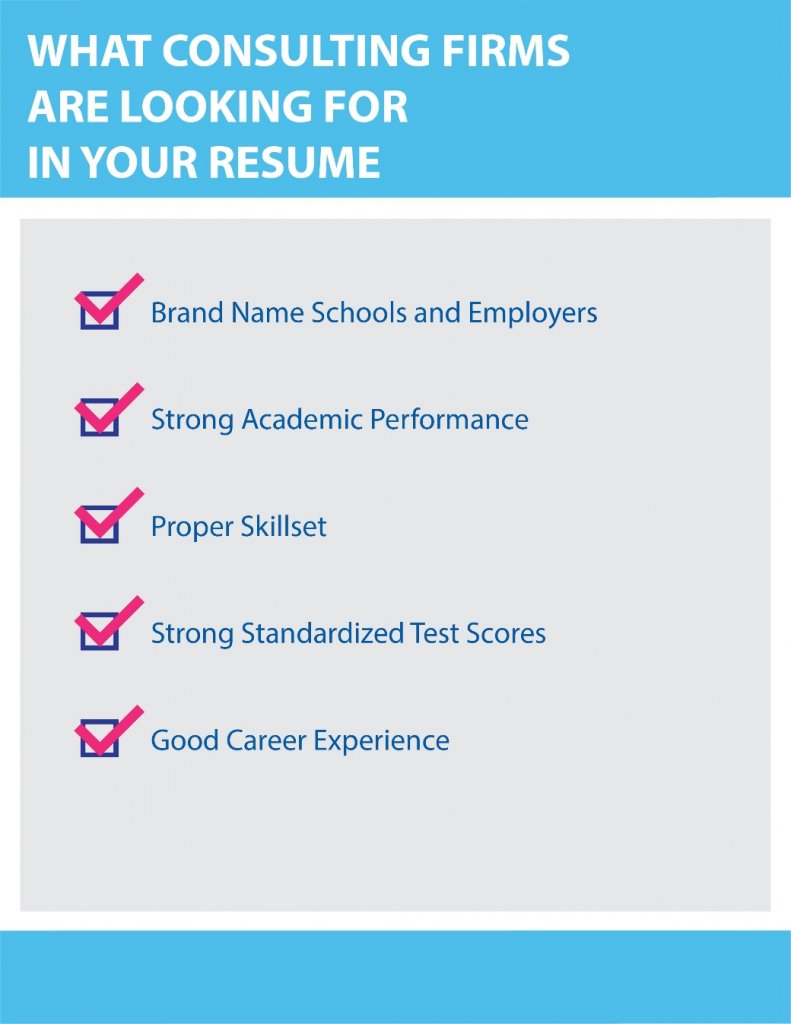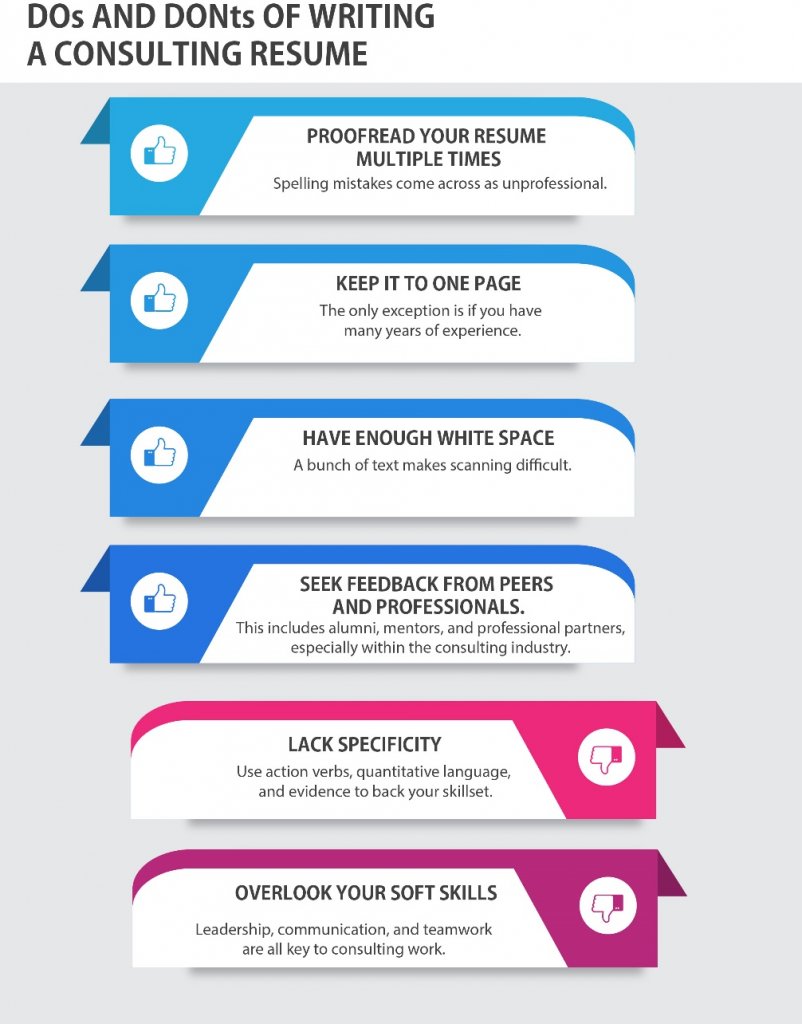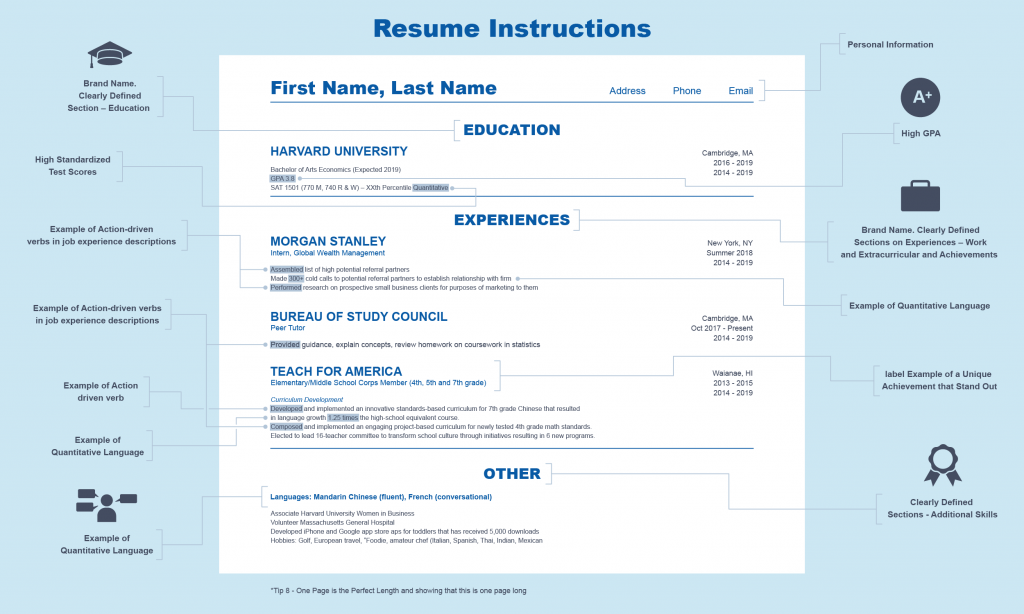For almost any professional job, applicants are required to provide a resume and cover letter to demonstrate their qualifications. Your resume is one of the most important documents during the application process, as it acts as a summary of your education, experience, and skillset.
In the consulting world, your resume is even more important. The top three consulting firms — McKinsey, Bain, and BCG — have acceptance rates of less than five percent during any given year. The resume screening step is where most applicants are eliminated. This goes to show just how important it is to write a strong consulting resume when applying to be a consultant.
FREE Resume Tips Email and Video Series
This form collects your name and email so that we can add you to our email list that delivers the free resources you are requesting. Check out our privacy policy for details on how we protect and manage your submitted data.
We’ll never spam you or share your email. Unsubscribe at any time.
A management consulting resume is different from your standard resume. The difference is not just in terms of format, but content, style, and overall approach. You probably know that the role of a consultant encompasses many different skillsets. A management consultant is a problem-solver, a data expert, and a communications professional, all bundled into one. Because consultants handle complex tasks using many different approaches, firms will be looking at your resume to determine if you have what it takes to be a successful hire. So, what goes into writing the perfect consulting resume? This piece will cover four essential guidelines that you should follow when preparing your resume for a consulting opportunity. By following these steps, you will be in a much better position to impress your employer and secure an interview.
1. Understand What Consulting Firms Are Looking for in Your Resume
In order to write a resume that will get you the interview, you must understand what top consulting firms look for when reviewing candidate applications.

These top firms care less about the proper format than they do about the qualifications and accomplishments that each candidate has. During resume screening, top consulting firms will pay attention to the following components of your resume:
- Brand Name Schools and Employers
The truth is that top consulting firms do care about which schools you attended and which employers you’ve worked for. They have a strong bias for brand name schools and employers that stand out to them and their clients. In fact, it’s the attention that the clients of the firm give to brand name schools that cause the interviewer to pay the same attention to your education background.
It’s not uncommon for a client seeking consulting services to be charged over $500,000 a year. As you would expect, such clients would want to ensure that any consultants working on their project are adequately qualified. Boasting a BS from Yale or an MBA from Harvard certainly adds points, even as a junior consultant working on a major project.
This doesn’t mean that you can’t get a consulting position if you went to a non-target school. However, if you have such brand names on your resume, make it easy for people to see.
- Academic Performance
Consulting firms also pay attention to academic performance. They want to know how you rank in your class and whether you have what it takes to tackle complex consulting projects. Therefore, include your GPA to differentiate your resume from others.
MBA applicants should include their GMAT scores and MBA GPA to be easily seen on their resume.
- Specific Skills Relevant to the Profession
Top consulting firms want to know that you have soft skills, including leadership and communication. While working in the profession, you will need to be able to handle difficult personalities, lead a team, and communicate important information in a manner that people can easily understand. Therefore, make sure you list experiences that demonstrate any leadership and communication experience, among other essential skills.
Activities that demonstrate such skills include job and internship responsibilities, extracurricular activities, and specific experiences that speak to these skills.
- Standardized Test Scores (Especially in Math)
Because grading can vary from one institution to another, top consulting firms would like to see your performance in standardized testing. High performance further strengthens your academic qualifications and shows consulting firms that you have what it takes to be a successful hire. Make sure you include high SATs, GRE, GMAT, MCAT, or LSAT scores in your resume.
- Career Experiences
Consulting firms want to see your career experiences, accompanied by what you achieved during your time in each position. Remember that these firms compare how long your career was with how much you achieved. You may need to show more accomplishments after working for eight years compared to one year.
Regardless of the number of years in a position, follow an achievement-based approach when describing your job. This means emphasizing outcomes, quantifying them, and highlighting parts of your job that apply most specifically to the consulting position in question
2. Properly Format Your Resume
Knowing what top consulting firms expect from your resume, is just the beginning of resume writing. While it does form a solid foundation to build upon, you should also know how to present your academic, professional, and extracurricular skills in a consulting resume.
A lot of this comes down to proper formatting. And by formatting, I don’t mean margins, font size, and columns. Rather, proper formatting refers to presenting your qualifications in a manner that the resume screener can easily identify.
Here are key points to remember when formatting your resume.
- Emphasize Brand Names
Make sure the brand name schools you attended, or big companies that you interned with, are clearly mentioned near the top of your resume. Have them in a bold font right after the name and contact information section.
- Proudly Display a High GPA
Along with brand names, include your high GPA right next to the school and program information. Remember that resume screeners are doing just that: screening your resume. If you make your distinguishing qualifications hard to find, you may be overlooked.
- One Page Does the Trick
This is perhaps the biggest caveat to consulting resume writing. How do you condense so many experiences and qualifications into just one page?
Starting early is key. Take time to reflect on your most relevant experiences, how you’ll allocate bullet points, and how you can play around with margins and line spacing to fit everything on one page. While this may sound challenging, it’s possible — unless you have many years of experience across multiple fields (which you can extend to a second page).
- Have Clearly Defined Sections
A typical consulting resume should be split into five clearly defined sections:
- Personal Information
- Education
- Work Experience
- Extracurricular Experiences and Achievements
- Additional Skills
While you don’t have to follow this format religiously, make sure the information you include covers all sections mentioned above. More importantly, don’t forget about your extracurricular achievements. This section gives you the opportunity to demonstrate important skills such as leadership, teamwork, and entrepreneurship.
- Use Action-Driven Verbs
When your resume is being screened, you have only seconds to attract the attention of your resume screener. So, it is essential that you give some thought to word choice. Start each bullet point with an action verb such as “lead,”“initiated,”“solved,”“saved,” etc. This will attract attention to your specific achievements and make you stand out from other applicants.
- Emphasize Language Skills
If you can speak multiple languages, you may stand out to consulting firms. A firm may view you as an asset for a specific market they’re targeting. Because consultancy is becoming global in today’s world, being fluent in more than one language can set you apart from other applicants.
- Keep It Simple
Remember that not all resume screeners are familiar with your specific field of work. Therefore, avoid industry-specific jargon when describing your accomplishments. Simplify this information in a manner that anyone can easily understand when reading through your resume.
- Demonstrate a Variety of Skills
Avoid falling victim to writing an incomplete resume. How could this happen? If you’ve been working as an engineer for many different companies, don’t include the same job responsibilities repeatedly throughout your resume. Instead, highlight unique experiences that demonstrate your diverse skillset. More importantly, emphasize your achievements rather than your daily responsibilities.
- Use Quantitative Language
The consulting field is driven by data. Numbers, quantities, and other similar information can attract attention to your skillset. As you outline achievements in your professional career, present them using quantified data backed by numbers.
For example, you could state how you developed a quality management system that resulted in lower production costs, from $40 per unit to $30 per unit (or something similar).
3. Stand Out from the Crowd
As you write a consulting resume, remember that you’re looking for any opportunity to stand out from thousands of other applicants. Similarly, resume screeners are looking for what makes you different.
Personal accomplishments such as distinguished scholarships, Olympic medals, or presidential honors can be the accomplishment that sets you apart from another similarly qualified candidate.
If you’ve done smaller, yet unique activities that others haven’t done, also include these in your resume. The goal is to take every opportunity to stand out from the competition.
4. Avoid Making Simple Mistakes
As you finalize your consulting resume, make sure you keep the following Dos and Don’ts in mind. These pointers can help you avoid common, easy-to-prevent mistakes so that you can submit an outstanding resume.
- DO: Proofread your resume multiple times.Spelling mistakes come across as unprofessional.
- DO: Keep it to one page. The only exception is if you have many years of experience.
- DO: Have enough white space.A bunch of text makes scanning difficult.
- DO: Seek feedback from peers and professionals.This includes alumni, mentors, and professional partners, especially within the consulting industry.
- DON’T: Lack specificity.Use action verbs, quantitative language, and evidence to back your skillset.
- DON’T: Overlook your soft skills.Leadership, communication, and teamwork are all key to consulting work.

As you can see from these tips, writing a consulting resume is different from a standard resume for other types of jobs. A consulting resume requires attention to detail, focus on your unique skillset, succinct language, and an achievement-based approach. Writing the perfect consulting resume is not as easy as many people think. It takes lots of time and attention.
Resume Example
Here is an example resume that highlights the tips I’ve mentioned. Reference this example as you create your resume to make sure that you hit all of the important sections. With the exception of your brand name schools/employers and GPA, these items do not need to appear in the order I have them listed. But, make sure that they are all represented in your resume.
Below is an example consulting resume. You can also download the example by clicking here.

More Resources:
FREE Resume Tips Email and Video Series
This form collects your name and email so that we can add you to our email list that delivers the free resources you are requesting. Check out our privacy policy for details on how we protect and manager your submitted data.
We’ll never spam you or share your email. Unsubscribe at any time.




127 thoughts on “Consulting Resume – The Ultimate Guide on How to Write the Perfect Consulting Resume”
Hi Victor,
Thanks for all the useful information. I am looking to break away from science and start a career in consulting. I have a BS in psychology from Michigan State with a 3.95 gpa, and am currently working on a PhD in neuroscience from Penn State College of Medicine (3.5 gpa). 730/800 quantitative on gre (no sat – got started at community college). What are my options and what firms should I be targeting? Should I try for an internship while I still have time?
Michelle,
Your school will be a bigger issue than your major. Accounting isn’t considered an exceptionally quantifiable field from the consulting firms point of view. If you had strong standardized test scores, it would be fine.
Networking can compensate for a non target school, a slightly below average GPA, or some other weakness is a candidates application, but it can’t compensate for more than one weak spot in most cases.
I’d say the top 3 would most likely be out of reach for you. The rest of the top 10 would be a stretch (depending on your overall application) if you networked a lot and did a ton of case prep (several hundred hours between the two activities).
My consulting resume toolkit has a resume scoring calculator to estimate the likelihood of your resume getting an interview. For networking advice, do a search on the site for “networking” and “non-target school” as there are several success stories from others that you can learn from.
Good luck,
Victor
Hi Victor,
I first wanted to comment on the number of posts you have replied to. I’m really surprised you get back to so many people! That’s awesome and greatly appreciated.
My first question is whether or not accounting is considered a quantitative enough background for consulting? I see most applicants are in engineering, science, economics, etc. I have excellent grades and a Master’s in Accounting but I wasn’t sure if this was an automatic deal breaker.
Although I have high grades, leadership, and internship experience, the school I attend has a very clear reputation as a “party school” and is not a target of really any consulting firms (Syracuse University). Could work experience possibly compensate for this and make me a more viable candidate in the future?
Thank you so much for your help!
Hi. I am a PhD student at Cambridge University, UK. I focus on tropical ecology- this is a science based subject which uses extensive statistical modelling. Prior to this I completed an MPhil in Environmental Sciences from Oxford Uni (with a 2.1) and a General Engineering degree. I will finish my PhD in late 2016. I would like to work in consulting and specifically target McKinsey. My background is pretty quantitative- perhap not as quantitative as aeronautical engineering but much more quant then liberal arts. I have not done internships ( owing to visa issues) but I have done fieldwork all over SE Asia and built useful links. I have several peer reviewed publications to my name. Should I try to gun for McKinsey?
Mini,
Your background seems similar to the background of other McKinsey consultants coming out of a PhD in Europe. I don’t know the UK grading system, so I can’t comment on your marks. Everything else seems comparable and I would encourage you to apply.
Also the level of math used in consulting 90% of the time involves adding, subtracting, multiplying, dividing, and calculating percentages. McK looks for quantitative backgrounds not because the math is difficult but rather because those with quantitative backgrounds think in a particular way that’s very useful in consulting.
Victor
Victor, I got already on my resume the big brand companies names but for a short period of time (less than a year).
Would you still suggest to keep the brand companies names on my resume?
Sincerely
FS
Francisco,
Generally speaking yes as it looks better than being unemployed. If it is only for 3 months and it is not clearly an internship, then you might want to think twice.
Victor
Hi Victor,
As an undergrad, I just wanted to ask if there was any real downside to excluding the SAT score. When I had a McKinsey consultant look into my resume (without the SAT score), he made no mention of a SAT score. I actually just graduated from college after this summer semester, and was thinking it might not make sense given I took the test about 4-5 years ago and have already graduated from college. What do you think?
Thank you for all your help! Much appreciated!
John
John,
Best case, a recruiter will call you to ask you for your numbers. Worst case, they reject you out right assuming the scores must be poor. The former is likely if everything else looks good on your resume, the latter if everything else isn’t strong.
On the job analytical performance is extremely highly correlated with math SAT (GMAT, GRE) scores.
Victor
Hi Victor,
I wanted your opinion on a quick question. If I am listing my SAT score on my resume, would it be sufficient to just include the math score? I got an 800 on the math but 650 in reading and 730 in writing and I’m not sure if the reading score in particular would raise any kind of red flag (if other applicants’ resumes have for instance very high Math and reading scores).
Thanks!
Bill,
You should list the full score and all the sub scores. If you only list one sub score, they will either send it back to you to complete or just reject the app assuming the others scores are too low.
Victor
Hi Victor,
Does one page CV applies to UK office applicants (from UK university)?
Thanks,
Joel
Hi Victor,
I’m thinking of pursuing a masters degree in management science instead of an MBA; simply because an MBA is longer and I do not want to work for 3 or 5 years before I do my masters. Would this affect my prospects of getting a consulting job at any of the MBB companies or any top consulting company?
Thanks in advance.
Kay,
Yes. Most likely you would be slotted with the post undergrad candidates. Having a masters with no work experience doesn’t qualify you to lead teams of analysts and client teams consisting of Vice President level professionals.
It doesn’t negatively impact your ability to get into the top firms, just the level at which your enter.
Victor
Hi Victor,
I just completed my undergraduate in Business with a top notch school in India( But I am afraid no one outside India would be aware of the prestige on my institution.) I wish to work for 2-3 years, then apply for an ivy league school in USA, after which I aim to eventually get into MBB.
Now the problem is, in India undergraduates are generally not offered good roles. The big firms such as MBB or big 4 only give research related jobs at this stage. And I have a offer for an analyst at a small firm. Its a smaller name, but it is better work and it is easier to get noticed and promoted.
Now, in order to achieve my long term goal of top school MBB, do you suggest I take the job at the smaller firm but better work, or should I look for a job in the bigger firm but bad work?
Ria,
For cross border careers, people with well known brand name employers on their resume have a major advantage. You have to decide if the benefit out weights the downside of potentially less interesting work. In addition, it helps to be at peace with your choice even if the second step of your career doesn’t work as planned.
No easy answers on this one.
Victor